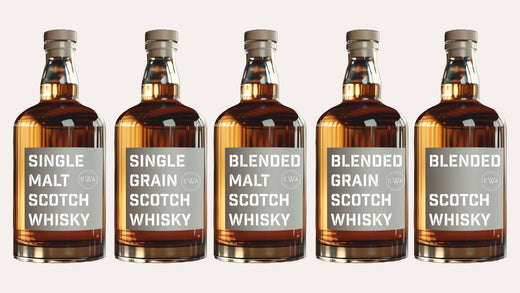Legal Definitions and Types of Scotch Whisky
Aug 16, 2023
Ever been bamboozled by malts, blends, blended malts and grain whiskies? You are not alone. We’ve put together a quick guide to help you decipher the different types of Scotch whisky and navigate your way through the world of Scotch like a pro.
The legal definition of Scotch whisky and its different types (categories) are governed by the Scotch Whisky Regulations 2009.
Here are the key points:
1. Legal Definition of Scotch Whisky
Scotch whisky is defined as a spirit distilled in Scotland from water and malted barley (to which only whole grains of other cereals may be added), fermented by the action of yeast and matured for at least three years in oak casks in Scotland.

2. Different Types of Scotch Whisky
a. Single Malt Scotch Whisky
This type of Scotch whisky is made exclusively from malted barley and produced at a single distillery using pot stills. It is known for its distinct flavours and characteristics that are influenced by the specific distillery's production methods and location.
b. Single Grain Scotch Whisky
Single grain Scotch whisky is made from a mixture of malted barley and other grains, such as maize (corn) or wheat and distilled at a single distillery using continuous column stills. Despite the name, "single grain" refers to the fact that the whisky comes from a single distillery, not a single type of grain.
c. Blended Scotch Whisky
Blended Scotch whisky is a combination of single malt whisky and single grain whisky from different distilleries. Blended Scotch whisky allows producers to create a consistent and balanced product by blending whiskies with varying flavour profiles and characteristics.
d. Blended Malt Scotch Whisky
Historically known as "vatted malt" or "pure malt," blended malt Scotch whisky is a blend of single malt whiskies from different distilleries. Unlike blended Scotch whisky, blended malt whisky does not contain any grain whisky and is made solely from malt whiskies.
e. Blended Grain Scotch Whisky
This type of Scotch whisky is a blend of single grain whiskies from different distilleries. Similar to blended malt whisky, blended grain whisky does not contain any malt whisky and is made solely from grain whiskies.
3. Aging Requirements for Scotch Whisky
All types of Scotch whisky must be matured in oak casks for a minimum of three years in Scotland. The age statement on a bottle of Scotch whisky refers to the youngest whisky in the blend or batch.
Why are Scotch whisky drinkers obsessed with age statements? One of our contributing experts, Iain Russell, explains all in this blog post.
These classifications and regulations ensure the quality, authenticity and integrity of Scotch whisky, preserving its global reputation as a premium spirit with a rich heritage and tradition.
Scotch Whisky Types: A Quick Recap
To recap, all types of Scotch whisky are produced in Scotland using water, malted barley and optionally other whole grains. They are distilled below 94.8% ABV and matured for at least three years in oak casks within Scotland.
Single Malt Scotch Whisky is a product of one malt distillery using pot still distillation. The ingredients are: malted barley, water and yeast. Blended Malt Scotch Whisky is a product of more than one malt distillery (a blend of more than one single malt whisky). The ingredients are: malted barley, water and yeast.
Single Grain Scotch Whisky is the product of only one grain distillery using either the traditional pot still distillation method or more commonly continuous distillation. The ingredients are: malted and unmalted barley, cereals (maize, wheat), water and yeast. Blended Grain Scotch Whisky is a product of more than one grain distillery (a blend of more than one single grain whisky). The ingredients are: malted and unmalted barley, cereals (maize, wheat) water and yeast.
Finally, Blended Scotch Whisky is a mix of one or more malt whiskies and one or more grain whiskies and is a product of numerous distilleries. The ingredients are malted and unmalted barley, cereals (maize, wheat), water and yeast.
What about “Single Cask”?
While not listed as a category under the Scotch Whisky Regulations 2009, it can often cause confusion. Single Cask simply means that the whisky in these bottles all originate from the same cask. See this Explainer: Single Cask Whisky.




1 comment
While not typical, blended Scotch does not have to be the “product of numerous distilleries” and can actually come from a single distillery – provided there are both continuous stills and pot stills on site. Loch Lomond exemplifies this.